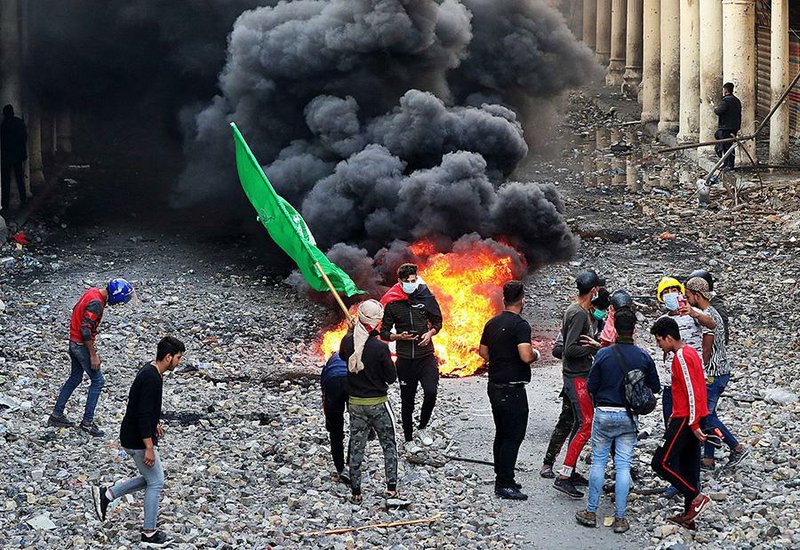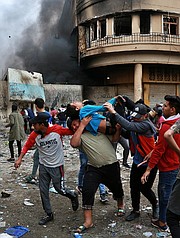BAGHDAD -- Security forces shot dead 40 anti-government protesters during 24 hours of bloodshed as violence spirals in the capital and Iraq's south, security and medical officials said Thursday, one day after an Iranian Consulate was torched.
Iran condemned the burning of its consulate in the holy city of Najaf as violence persisted into the night across southern Iraq, where security forces had killed 36 protesters and wounded 245 since Wednesday evening, the officials said. Another four protesters were shot dead in the capital. The officials spoke on condition of anonymity in line with regulations.
Police and military forces were deployed across key oil-rich provinces to reopen roads closed off by demonstrations.
The escalating violence and heavy response against demonstrators by a largely Iran-backed government threatened to intensify tensions, especially if efforts to implement electoral and anti-corruption reforms fail to placate protesters.
Crisis committees were created to enhance coordination between Prime Minister Adil Abdul-Mahdi and governors in provinces affected by the protests "for the importance of controlling security and enforcing the law," said a statement from the joint operations command.
Security forces shot four protesters dead in Baghdad and wounded 22 when they tried to cross the important Ahrar Bridge leading to the nearby Green Zone, the heavily fortified seat of Iraq's government. Protesters occupy parts of the Jumhuriya, Sinak and Ahrar bridges, all of which lead to or near the fortified area.
In Najaf, five protesters were fatally shot and 32 wounded when security forces opened fire to prevent them from torching a central mosque named after the father of a prominent political leader, officials said.
The deaths came a day after protesters burned the Iranian Consulate in Najaf. It was one of the worst attacks targeting Iranian interests in the country since the anti-government protests broke out two months ago.
"For a month, we've been protesting but the government treated us like we don't even exist," said activist Yasser Mahmoud, who said protests in Najaf had been peaceful until now.
"We went for the consulate because now we are aware who is the reason behind all that we are going through," he said. "Iran controls all these Islamic parties and their armed militias in the streets that have made our life like hell -- they are controlling the economy of the city and everything goes to them. Meanwhile, we can't even get a job."
IRANIANS WEIGH IN
The unrest in Iraq began on Oct. 1, when thousands took to the streets in Baghdad and the predominantly Shiite south. The largely leaderless movement accuses the government of being hopelessly corrupt and has decried Iran's growing influence in Iraqi state affairs.
At least 350 people have been killed by security forces, which routinely use live ammunition and tear gas to disperse crowds.
Iran has called for a "responsible, strong and effective" response to the burning of its consulate, Abbas Mousavi, a Foreign Ministry spokesman, said in statements to Iran's official IRNA news agency.
Iraq's Foreign Affairs Ministry condemned the attack, saying it was perpetrated by "people outside of the genuine protesters" seeking to harm relations between the countries.
One demonstrator was killed and 35 wounded when police fired live ammunition in a failed effort to prevent protesters entering the consulate building. Once inside, the demonstrators removed the Iranian flag and replaced it with an Iraqi one, said a police official who spoke on condition of anonymity in line with regulations.
A curfew was imposed in Najaf after the attack on the consulate. Security forces were heavily deployed around main government buildings and religious institutions Thursday morning.
Najaf province is the headquarters of the country's Shiite religious authority headed by Grand Ayatollah Ali al-Sistani. He has been largely supportive of protester demands, siding with them by repeatedly calling on political parties to implement serious changes.
Influential Shiite cleric Muqtada al-Sadr called on Iraq's government to resign "immediately to stop the bloodletting," while imploring protesters to maintain the peace.
"If the government does not resign, this will be the beginning of the end of Iraq," he warned.
Militia leaders close to Iran issued a statement Thursday saying that al-Sistani, the spiritual leader for much of Iraq's Shiite majority, was in danger because of the protests and vowed to protect him.
Al-Sistani, who is Iranian, has sought to curb the Shiite theocracy's influence in Iraq and has backed the demonstrators' calls for change.
"We will cut the hands of anyone who tries to touch him," said Abu Mahdi al-Muhandes, commander of the Popular Mobilization Forces, an umbrella coalition of Shiite militias with close ties to Iran.
Qais al-Khazali, another powerful militia leader, issued a warning to protesters in Najaf.
"Whoever wants to test us is welcome to try," he said.
Al-Sadr, who has supported the protests, also categorically denied that his supporters were involved in the attack on the Iranian Consulate in Najaf.
In addition to using sit-ins and burning tires to close main avenues, protesters have lately targeted Iraqi economic interests in the south by blocking key ports and roads to oil fields.
BATTLE FOR BRIDGES
In the oil-rich city of Nasiriyah, 31 protesters were killed overnight and 215 wounded by security forces who fired to drive them away from key bridges, security and medical officials said Thursday. Demonstrators had been blocking Nasr and Zaitoun bridges leading to the city center for several days. Security forces moved in late Wednesday to open the main thoroughfare.
A medical official described the scene at Nasiriyah's main hospital as "tragic" as women wailed over the bodies of dead family members. Protesters then blocked a major highway and surrounded the police station, according activist Ali al-Ghizzi, 31.
"The scenes from Nasiriyah ... more closely resemble a war zone than city streets and bridges," said Lynn Maalouf, Middle East research director at Amnesty International.
By Thursday afternoon, special forces were transferred from neighboring Najaf and Diwanieh provinces to Nasiriyah to contain the violence, security officials said.
Amnesty International denounced the violence, calling it a bloodbath that "must stop now."
The governor of Dhi Qar province, of which Nasiriyah is the capital, asked Abdul-Mahdi to withdraw the Interior Ministry forces and their commander, Lt. Gen. Jamil al-Shammari. He was the one who ordered the troops to remove protesters from the bridges over the Euphrates River that they had blocked, and he had overseen the shooting.
"The ongoing campaign, with its bloody incidents since dawn, has obstructed efforts to calm down the situation, especially after our joint decision with the police command to withdraw the anti-riot forces outside the limits of Nasiriyah city and not to clash with the demonstrators," the governor, Adil al-Dikhili, wrote to Abdul-Mahdi.
The governor was referring to his strategy during the past two weeks to try to accommodate the protesters who had set up tents blocking two of the bridges over the Euphrates River and to avoid clashes by having the Quick Reaction Forces withdraw rather than stay in the center city.
At 3 a.m. Thursday, the reinforcements for the Quick Reaction Forces from Baghdad, and their new commander, arrived with bulldozers to knock down the tents and force out the protesters. When the protesters resisted, the forces opened fire, killing at least 25 people and leaving many bleeding and injured on the ground.
In Basra, security forces were deployed in the city's main roads to prevent protesters from staging sit-ins on important avenues.
Basra's streets were open as of Thursday morning, but highways leading to the two main Persian Gulf commodities ports in Umm Qasr and Khor al-Zubair remained closed. Schools and official public institutions were also closed.
Separately, the U.S. Embassy denounced a recent decision by Iraq's media regulator to suspend nine television channels, calling for the Communications and Media Commission to reverse its decision. The embassy's Thursday statement also condemned attacks and harassment against journalists.
Channel Dijla TV had its license suspended Tuesday for its coverage of the protests, and its office was closed and equipment confiscated, according an official from one of the channels under threat. Other channels have been asked by the regulatory commission to sign a pledge "agreeing to adhere to its rules," said the official, who requested anonymity out of fear of reprisal.
The Islamic State extremist group, meanwhile, claimed responsibility for Tuesday's coordinated bombings in three Baghdad neighborhoods that killed five people. The bombings, which occurred far from Tahrir Square where demonstrators are camped, was the first apparent coordinated attack since anti-government protests began.
Information for this article was contributed by Samya Kullab and Murtada Faraj of The Associated Press; by Mustafa Salim, Erin Cunningham, Paul Schemm and Brian Murphy of The Washington Post; and by Alissa J. Rubin and Falih Hassan of The New York Times.
A Section on 11/29/2019

